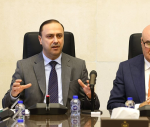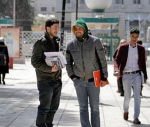You are here
We need a positive national position towards global trends that also afflict Jordan
Nov 10,2018 - Last updated at Nov 10,2018
This weekend was a difficult one for Jordanians. Not only was it the 13th anniversary of the coordinated terrorist attack on hotels in Amman that took the lives of 60 people and injured 115, but we also watched anxiously as rescue missions were undertaken around the Kingdom to save people impacted by floods, in what threatened to be a repeat of the tragedy of two weeks ago in the Dead Sea that also had a heavy human toll.
Over the weekend we also heard of the suspicious disappearance of the Secretary General of the Mominoun (Believers) Without Borders Centre for Research Younis Qandil and then locating him Saturday morning abandoned after what reports say was a physical attack against him. Qandil was caught up in controversy over an academic workshop that his organisation intended to host and which was looking at religion and history. The conference, banned by the minister of Interior after it was contested by the Islamic Action Front spokesperson in Parliament, Deputy Deema Tahboub, stirred a national debate on whether the government was placating Islamist political groups at the expense of freedom of speech and opinion.
The three “events” are unrelated obviously. But I think that these and several other updates we hear of more regularly these days whether of suicides, freak accidents, terrorist attacks, hate crimes, refugee and migration waves, wars and even natural disasters spell out a changing reality for Jordan, that perhaps we have yet to absorb and accept.
We are not a small, self-enclosed and self-determining Kingdom that can operate in isolation of any of the global trends. We are part and parcel of the global calamities, mishaps, misfortunes, movements and even political and social tendencies that befall Jordan in real time and in parallel with similar incidents around the world and the region. Although we have always understood that Jordan is at the epicentre of the Middle East region and, therefore, was often impacted by its geopolitical changes, the circle appears to have now widened geographically and expanded with regards to the types of issues that now travel across borders globally.
Terrorist attacks are universal, natural disasters are universal, intolerance and hate are universal, etc., but our acceptance and understanding of our non-unique position within these events may not have matured enough to adequately inform our reactions, perceptions and our interaction with those events, whether at government or citizen level.
I believe that we are currently in transition with regards to taking account of the changes in formulating our national perception of who we are, where we are located and how differently the change is impacting us, as citizens and as a country.
I also honestly believe that a national conversation, led at the leadership level, is needed to articulate the change and its meaning and, therefore, strategise on how we all should understand our new reality and mainstream that understanding across our policies and actions with regards to government and also our perceptions and attitudes with regards to citizens.
We need to develop the national narrative and subsequent national strategy and plan to focus on the positive opportunities inherent in any global change, regardless of how challenging the picture may appear in the first instance. We essentially need to plan to control any negative impact while protecting our value system of good citizenship and institutional integrity.
At the risk of complicating the idea, I would argue that what is needed today is a text and context analysis to review the past with a different lens that is more focused on planning for a doable, implementable, tenable and hopefully brighter future. It is the only pathway to finding national cohesion and, therefore, subverting any attempts to divide us and problematise our internal affairs.
I know that all these sentences appear to be speaking in the abstract, but let us look deeper at some of how this would work.
Countering or preventing terrorism or extremism is probably the most mature example because already Jordan has publicly positioned itself at the forefront of countering violent extremism or preventing violent extremism efforts and is coordinating globally with similarly afflicted countries.
Yet, the trickle-down understanding of the motives behind Jordan’s position and the centrality of this issue to a global world, remains contentious and problematised at the citizen level, and maybe even within pockets of government and state functions.
And therein lies the disconnect. How can we explain the national feeling of sorrow and anger over the terrorist attack in Jordan 13 years ago, as well as other smaller but equally painful attacks in Jordan over the many years since then, but then allow a narrative of hate against academics who want to plug into universal conversations around the history of religion? Or even allow a dichotomising narrative around citizenship and identity? Or even pick on conservative Muslims and derogate their personal choices? Similarly derogate liberals and problematise their personal lifestyle? How do we want to end terrorism but in parallel distrust Jordan’s efforts to protect against any repetition of these attacks?
I know this conversation is very controversial but this controversial conversation is one that needs to be had if we are going to connect the dots. What is it that makes us hate the actions of terrorists but defend their ideological justification, for example? And here I am not referring to the religion of Islam, obviously, since it is clear that terrorism is not an Islamic trend nor a by-product of conservative religiosity. I believe that there is agreement that terrorism is a violent manifestation of the mood of intolerance for others that we see globally and across all religions. In some cases, it hides behind the cloak of religion, in others it hides behind a narrative of nationalism when it is really only an aspirational climb to personal gain.
So what is missing on the terrorism issue, therefore, is a national consensus that is borne out of a transparent discussion of the situation globally, regionally and within a Jordanian context, followed by a committed government plan to attack not only the actual perpetrators of terrorist crimes, but also the enabling environment in which trends of intolerance and its narrative of hate incubate and multiply.
To achieve national consensus, there must be a clear plan that is consistent, clear and supported by a legal framework that protects the non-negotiable freedom of speech and opinion but also guards against intolerance, bigotry, xenophobia, hate and prejudice, which ultimately are the real culprits behind terrorism globally. If all citizens, regardless of their personal choices, learned that the law equally protects them and others who are not like them, then they will learn to respect that law.
Similarly, natural disasters are also a global phenomenon that need understanding of the natural causes within the global climate change discussions, followed by planning and strategising with other similarly impacted countries globally, in order to build the knowledge, infrastructure, processes and citizen awareness on how to tackle these events when they occur, and prevent their destructive impact. We are not the only country with valleys threatened by flashfloods and severe and sudden weather conditions, we need to learn how to deal with them.
Instructions and safety regulations, extracted from best practice globally, that protect citizens and country and that are spelled out to all, understood by all and implemented without interruption or exception, will indicate clear paths to liability, accountability and responsibility, and eventually will become a point of national consensus and cohesion and will avert the state of confusion that accompanied the disaster at the Dead Sea a couple of weeks ago.
The ultimate aim of this exercise would be to invest our time and energy into constructive planning for the cohesion, harmony, integrity and safety of our citizens of our country whether it is a case of terrorism, natural disaster or difference of opinion.
Whether the issue is politically controversial, technically challenging or value-laden, we cannot shy away from it or sweep it under the carpet as if it is a specifically Jordanian disease happening in isolation from global trends. There are many models of best practice out there for dealing with all these issues.
We also need to steer away from what appears to be our Jordanian need to find a party to blame and attack, often following a predictable pattern where the citizens blame the corruption and inefficiency of the government and equally the government blames the disloyalty and ignorance of the citizens, to absolve ourselves of our collective responsibility to learn and plan together not only within the country but in harmony with our global partners.












